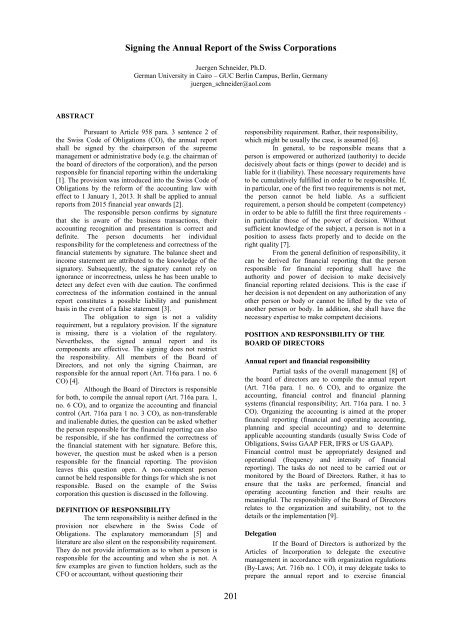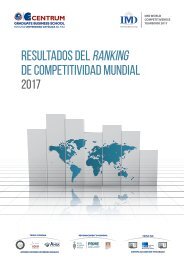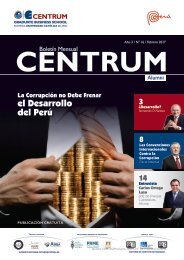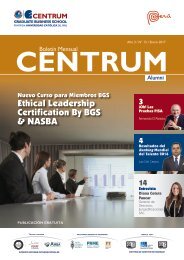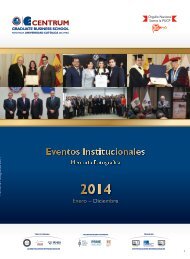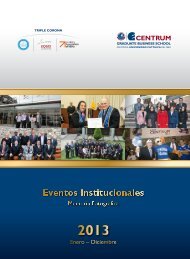Pan-Pacific Conference XXXIV. Designing New Business Models in Developing Economies
This publication represents the Proceedings of the 34th Annual Pan-Pacific Conference being held in Lima, Peru May 29-31, 2017. The Pan-Pacific Conference has served as an important forum for the exchange of ideas and information for promoting understanding and cooperation among the peoples of the world since 1984. Last year, we had a memorable conference in Miri, Malaysia, in cooperation with Curtin University Sarawak, under the theme of “Building a Smart Society through Innovation and Co-creation.” Professor Pauline Ho served as Chair of the Local Organizing Committee, with strong leadership support of Pro Vice-Chancellor Professor Jim Mienczakowski and Dean Jonathan Winterton.
This publication represents the Proceedings of the 34th Annual Pan-Pacific Conference being held in Lima, Peru May 29-31, 2017. The Pan-Pacific Conference has served as an important forum for the exchange of ideas and information for promoting understanding and cooperation among the peoples of the world since 1984. Last year, we had a memorable conference in Miri, Malaysia, in cooperation with Curtin University Sarawak, under the theme of “Building a Smart Society through Innovation and Co-creation.” Professor Pauline Ho served as Chair of the Local Organizing Committee, with strong leadership support of Pro Vice-Chancellor Professor Jim Mienczakowski and Dean Jonathan Winterton.
Create successful ePaper yourself
Turn your PDF publications into a flip-book with our unique Google optimized e-Paper software.
Sign<strong>in</strong>g the Annual Report of the Swiss Corporations<br />
Juergen Schneider, Ph.D.<br />
German University <strong>in</strong> Cairo – GUC Berl<strong>in</strong> Campus, Berl<strong>in</strong>, Germany<br />
juergen_schneider@aol.com<br />
ABSTRACT<br />
Pursuant to Article 958 para. 3 sentence 2 of<br />
the Swiss Code of Obligations (CO), the annual report<br />
shall be signed by the chairperson of the supreme<br />
management or adm<strong>in</strong>istrative body (e.g. the chairman of<br />
the board of directors of the corporation), and the person<br />
responsible for f<strong>in</strong>ancial report<strong>in</strong>g with<strong>in</strong> the undertak<strong>in</strong>g<br />
[1]. The provision was <strong>in</strong>troduced <strong>in</strong>to the Swiss Code of<br />
Obligations by the reform of the account<strong>in</strong>g law with<br />
effect to 1 January 1, 2013. It shall be applied to annual<br />
reports from 2015 f<strong>in</strong>ancial year onwards [2].<br />
The responsible person confirms by signature<br />
that she is aware of the bus<strong>in</strong>ess transactions, their<br />
account<strong>in</strong>g recognition and presentation is correct and<br />
def<strong>in</strong>ite. The person documents her <strong>in</strong>dividual<br />
responsibility for the completeness and correctness of the<br />
f<strong>in</strong>ancial statements by signature. The balance sheet and<br />
<strong>in</strong>come statement are attributed to the knowledge of the<br />
signatory. Subsequently, the signatory cannot rely on<br />
ignorance or <strong>in</strong>correctness, unless he has been unable to<br />
detect any defect even with due caution. The confirmed<br />
correctness of the <strong>in</strong>formation conta<strong>in</strong>ed <strong>in</strong> the annual<br />
report constitutes a possible liability and punishment<br />
basis <strong>in</strong> the event of a false statement [3].<br />
The obligation to sign is not a validity<br />
requirement, but a regulatory provision. If the signature<br />
is miss<strong>in</strong>g, there is a violation of the regulatory.<br />
Nevertheless, the signed annual report and its<br />
components are effective. The sign<strong>in</strong>g does not restrict<br />
the responsibility. All members of the Board of<br />
Directors, and not only the sign<strong>in</strong>g Chairman, are<br />
responsible for the annual report (Art. 716a para. 1 no. 6<br />
CO) [4].<br />
Although the Board of Directors is responsible<br />
for both, to compile the annual report (Art. 716a para. 1,<br />
no. 6 CO), and to organize the account<strong>in</strong>g and f<strong>in</strong>ancial<br />
control (Art. 716a para 1 no. 3 CO), as non-transferable<br />
and <strong>in</strong>alienable duties, the question can be asked whether<br />
the person responsible for the f<strong>in</strong>ancial report<strong>in</strong>g can also<br />
be responsible, if she has confirmed the correctness of<br />
the f<strong>in</strong>ancial statement with her signature. Before this,<br />
however, the question must be asked when is a person<br />
responsible for the f<strong>in</strong>ancial report<strong>in</strong>g. The provision<br />
leaves this question open. A non-competent person<br />
cannot be held responsible for th<strong>in</strong>gs for which she is not<br />
responsible. Based on the example of the Swiss<br />
corporation this question is discussed <strong>in</strong> the follow<strong>in</strong>g.<br />
DEFINITION OF RESPONSIBILITY<br />
The term responsibility is neither def<strong>in</strong>ed <strong>in</strong> the<br />
provision nor elsewhere <strong>in</strong> the Swiss Code of<br />
Obligations. The explanatory memorandum [5] and<br />
literature are also silent on the responsibility requirement.<br />
They do not provide <strong>in</strong>formation as to when a person is<br />
responsible for the account<strong>in</strong>g and when she is not. A<br />
few examples are given to function holders, such as the<br />
CFO or accountant, without question<strong>in</strong>g their<br />
responsibility requirement. Rather, their responsibility,<br />
which might be usually the case, is assumed [6].<br />
In general, to be responsible means that a<br />
person is empowered or authorized (authority) to decide<br />
decisively about facts or th<strong>in</strong>gs (power to decide) and is<br />
liable for it (liability). These necessary requirements have<br />
to be cumulatively fulfilled <strong>in</strong> order to be responsible. If,<br />
<strong>in</strong> particular, one of the first two requirements is not met,<br />
the person cannot be held liable. As a sufficient<br />
requirement, a person should be competent (competency)<br />
<strong>in</strong> order to be able to fulfill the first three requirements -<br />
<strong>in</strong> particular those of the power of decision. Without<br />
sufficient knowledge of the subject, a person is not <strong>in</strong> a<br />
position to assess facts properly and to decide on the<br />
right quality [7].<br />
From the general def<strong>in</strong>ition of responsibility, it<br />
can be derived for f<strong>in</strong>ancial report<strong>in</strong>g that the person<br />
responsible for f<strong>in</strong>ancial report<strong>in</strong>g shall have the<br />
authority and power of decision to make decisively<br />
f<strong>in</strong>ancial report<strong>in</strong>g related decisions. This is the case if<br />
her decision is not dependent on any authorization of any<br />
other person or body or cannot be lifted by the veto of<br />
another person or body. In addition, she shall have the<br />
necessary expertise to make competent decisions.<br />
POSITION AND RESPONSIBILITY OF THE<br />
BOARD OF DIRECTORS<br />
Annual report and f<strong>in</strong>ancial responsibility<br />
Partial tasks of the overall management [8] of<br />
the board of directors are to compile the annual report<br />
(Art. 716a para. 1 no. 6 CO), and to organize the<br />
account<strong>in</strong>g, f<strong>in</strong>ancial control and f<strong>in</strong>ancial plann<strong>in</strong>g<br />
systems (f<strong>in</strong>ancial responsibility; Art. 716a para. 1 no. 3<br />
CO). Organiz<strong>in</strong>g the account<strong>in</strong>g is aimed at the proper<br />
f<strong>in</strong>ancial report<strong>in</strong>g (f<strong>in</strong>ancial and operat<strong>in</strong>g account<strong>in</strong>g,<br />
plann<strong>in</strong>g and special account<strong>in</strong>g) and to determ<strong>in</strong>e<br />
applicable account<strong>in</strong>g standards (usually Swiss Code of<br />
Obligations, Swiss GAAP FER, IFRS or US GAAP).<br />
F<strong>in</strong>ancial control must be appropriately designed and<br />
operational (frequency and <strong>in</strong>tensity of f<strong>in</strong>ancial<br />
report<strong>in</strong>g). The tasks do not need to be carried out or<br />
monitored by the Board of Directors. Rather, it has to<br />
ensure that the tasks are performed, f<strong>in</strong>ancial and<br />
operat<strong>in</strong>g account<strong>in</strong>g function and their results are<br />
mean<strong>in</strong>gful. The responsibility of the Board of Directors<br />
relates to the organization and suitability, not to the<br />
details or the implementation [9].<br />
Delegation<br />
If the Board of Directors is authorized by the<br />
Articles of Incorporation to delegate the executive<br />
management <strong>in</strong> accordance with organization regulations<br />
(By-Laws; Art. 716b no. 1 CO), it may delegate tasks to<br />
prepare the annual report and to exercise f<strong>in</strong>ancial<br />
201


